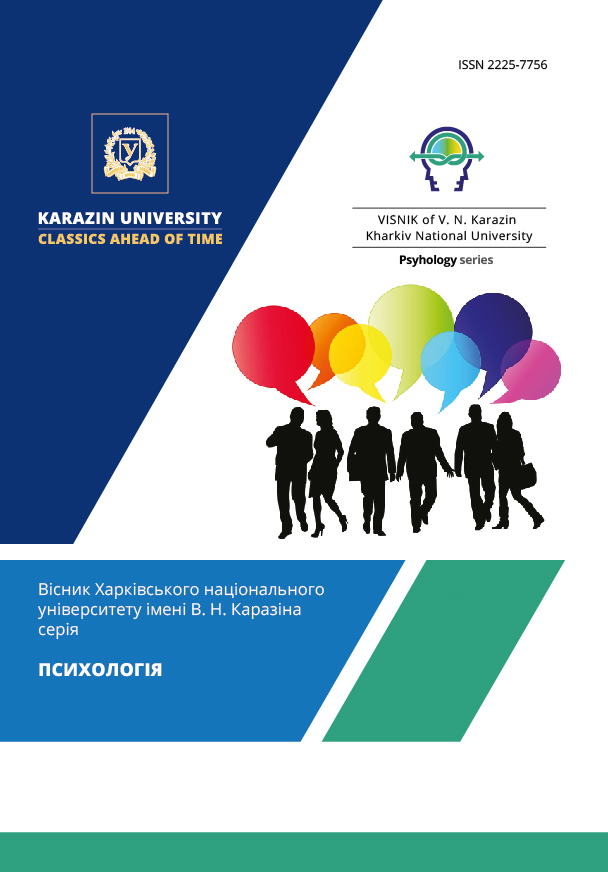DIAGNOSTICS METHOD OF INTERPERSONAL RELATIONS BETWEEN THE CURATOR AND STUDENTS
Abstract
The method of diagnosing interpersonal interactions of curators and students is designed to study the perception of curators and students in the academic group about themselves and the curator, as well as to study the relationship between curators and students of the group. The method determines the type of attitude to the curator in self-assessment and mutual assessment. The technique is constructed according to the type of Likert scale. The statements in the form of small crafts in Ukrainian folklore are selected for evaluation - proverbs and sayings, which in content are the quintessence of folk ideas about human relations, and in form - concise and easy to understand. In addition, a statement in "metaphorical" form is subjectively easier to evaluate than a direct answer.
There are variables that determine the type of attitude to the curator: "Understanding and democracy"; "One step ahead: attentiveness and foresight", "Efficiency, teamwork efficiency". These characteristics reflect various aspects of interpersonal interaction in the academic group, where the curator may pay attention to each of the participants in the educational process, and may be careless and biased; can organize team activities, express their ideas and wishes; predict the likelihood of problematic, conflict situations and manage the process of their resolution, and may, conversely, be passive, inactive, critical of social phenomena and others, provoke conflicts and misunderstandings.
The interpersonal interaction of the curator and students is analyzed in a three-dimensional space, which is created by axes: understanding and democracy - misunderstanding and despotism; attentiveness and foresight - inattention and short-sightedness; efficiency, effective teamwork - passivity, unproductive teamwork.
The method can be used to assess the behavior of the curator in the assessment of students (from the outside), for self-assessment of the curator and the description of the ideal curator. Depending on the level of diagnosis, the instructions change.
Downloads
References
Буянова, Г. В. (2014). Обязанности куратора академической группы в нормативных документах вузов. Современные проблемы науки и образования, 6, 23-45. URL: https://www.science-education.ru/ru/article/view?id=16691
Васильева, Л. М. (2011). Профессиональная деятельность кураторов студенческой группы в колледже. URL: https://superinf.ru/view_helpstud.php?id=1608.
Васильєва, М. О. (2014). Роль та значення куратора в організації виховної роботи у вищій школі. Проблеми інженерно-педагогічної освіти, 42(43). URL: http://library.uipa.edu.ua/images/data/zbirnik/42-43/44.pdf..
Василюк, Ф. Е. (1984). Психология переживания. М.: МГУ. URL: http://psychlib.ru/mgppu/vas/vas-001-.htm#$p1
Гетьман, І. А. (2008). Місце і роль куратора в навчально-виховному процесі вищого технічного навчального закладу. Вісник Черкаського університету. Серія педагогіні науки. Черкаси, 125, 159-163.
Желябіна, Н. К. (2007). Інноваційні комунікативні технології в роботі куратора академічної групи. Методичні рекомендації. Запоріжжя: ЗДІА, 45-66. URL: http://www.zgia.zp.ua/gazeta/OVO_inovacii_kurator.pdf
Жукова, С. Ю. & Голенова, И. А. (2017). Роль куратора в профессиональном и культурном становлении студентов медицинского университета. Достижения фундаментальной, клинической медицины и фармации. Материалы 72-й научн. сес. сотр. ун-та, 25-26 янв. Витебск: ВГМУ, 375-377. URL: http://elib.vsmu.by/handle/123/12373
Ільченко, А. А. (2017). Роль куратора академічної групи у вищому навчальному закладі. Актуальні проблеми вищої педагогічної освіти. Серія Педагогічні науки,.144, 45-48. URL: http://VchdpuP_2017_144_13.pdf
Карташова, Е. А. & Шаповал, Г. Н. (2018). Профессиональное кураторство как неотъемлемая часть профессионального педагогического мастерства. Проблемы взаимодействия науки и общества, сборник статей Международной научно - практической конференции. Новосибирск: «Автерна». 185–189. URL: https://www.elibrary.ru/item.asp?id=32511315
Омельченко, С. (2007). Куратор академічної групи – домінуюча фігура у процесі формування здорового способу життя студентської молоді. Гуманізація навч.-вих. процесу. Слов’янськ: СДПУ, 34,. 40-45.
Орлов, А. Б. (1995). Личность и сущность: внешнее и внутреннее Я человека. Вопросы психологии, 2, 5-19. http://www.voppsy.ru/issues/1995/952/952005.htm
Підбуцька, Н. В. (2011). Куратор у навчально-виховному процесі ВНЗ. Сучасні інформаційні технології та інноваційні методики навчання в підготовці фахівців: методологія, теорія, досвід, проблеми, 27, 450-454. URL: http://Sitimn_2011_27_89%20(3).pdf
Резніченко, О. М. (2013). Умови ефективної позааудиторної роботи куратора у вищих технічних навчальних закладах. Проблеми інженерно-педагогічної освіти, Х.: УІПА. URL: http://hdl.handle.net/123456789/3152
Романова, С. В. (2006). Організаційно-виховна робота куратора академічної групи у вищих технічних навчальних закладах (Автореф. дис. канд. пед. наук). Східноукраїнський національний ун-т ім. Володимира Даля, Луганськ.
Хриков, Є. М. (2002). Методичні рекомендації до роботи куратора студентської групи вищих навчальних закладів I-IV рівнів акредитації. Луганськ: Луганський педагогічний ун-т ім. Тараса Шевченка.
Шакуров, Р. Х. (1995). Психология руководства педагогическим коллективом: Учебное пособие для педвузов. М.: ИЧП Изд-во Магистр.
Школьна, М. (2017). До питання готовності кураторів студентських груп до виховання соціальної зрілості у студентів аграрних коледжів. Молодь і ринок, 7(150), 165–169. URL: Mir_2017_7_32.pdf
Яновська, С.Г., Базилевська, Л.О. & Туренко, Р.Л. (2020). From Curatoring to Tutor: Features of Students’ Imagination. Вісник Харківського національного університету імені В. Н. Каразіна Серія Психологія, 67, 69–74. DOI: https://doi.org/10.26565/2225-7756-2019-67-10
Baruch, A. F., Gadot, R. (2018) Preservice Teachers Insights from a Social Curation Experience. 12th International Technology, Education and Development Conference (Inted). Valencia, Spain. S. 1658-1663.
Condie, J.M. Ayodele, I., Chowdhury, S., Powe, S., Cooper, A.M. (2018) Personalizing Twitter Communication: an Evaluation of 'Rotation-Curation' for Enhancing Social Media Engagement Within Higher Education. Journal of Marketing for Higher Education, Т: 28, V 2. S. 192-209. https:// doi.org/ 10.1080/08841241.2018.1453910
Sharok, V. (2018) Role of Socio-Psychological Factors of Satisfaction with Education in the Quality Assessment of University. International Journal for Quality Research, Т: 12, V 2. S. 281-296. https:// doi.org/ 10.18421/IJQR12.02-01
Tsybulsky, D. (2020) Digital Curation for Promoting Personalized Learning: a Study of Secondary-School Science Students’ Learning Experiences. Journal of Research on Technology in Education, T 52, V 3. S. 429-440. https:// doi.org/ 10.1080/15391523.2020.1728447




